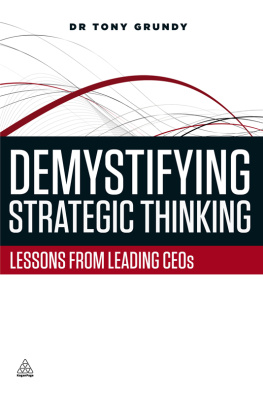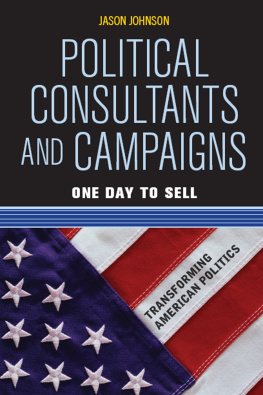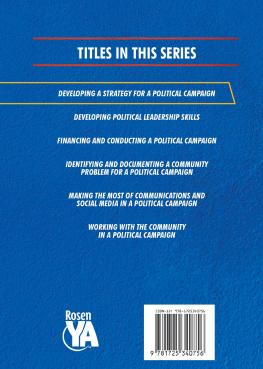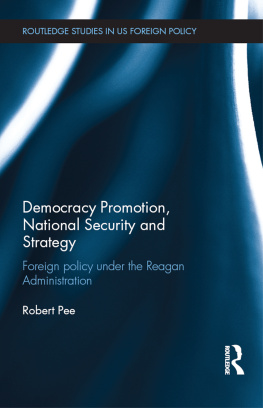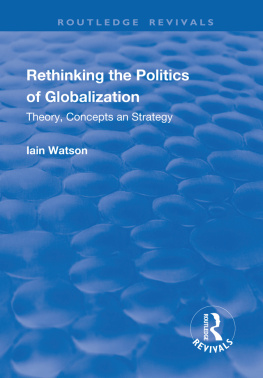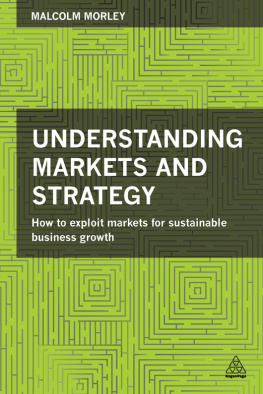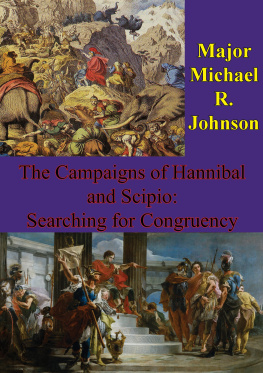Strategy in Politics

Oxford University Press is a department of the University of Oxford. It furthers the Universitys objective of excellence in research, scholarship, and education by publishing worldwide. Oxford is a registered trade mark of Oxford University Press in the UK and certain other countries.
Published in the United States of America by Oxford University Press
198 Madison Avenue, New York, NY 10016, United States of America.
Oxford University Press 2023
All rights reserved. No part of this publication may be reproduced, stored in a retrieval system, or transmitted, in any form or by any means, without the prior permission in writing of Oxford University Press, or as expressly permitted by law, by license, or under terms agreed with the appropriate reproduction rights organization. Inquiries concerning reproduction outside the scope of the above should be sent to the Rights Department, Oxford University Press, at the address above.
You must not circulate this work in any other form and you must impose this same condition on any acquirer.
Library of Congress Cataloging-in-Publication Data
Names: Arterton, F. Christopher, author.
Title: Strategy in politics : plotting victory in a democracy / F. Christopher Arterton.
Description: New York : Oxford University Press, [2023] |
Includes bibliographical references and index.
Identifiers: LCCN 2022036110 (print) | LCCN 2022036111 (ebook) |
ISBN 9780197644836 (hardback) | ISBN 9780197644843 (paperback) |
ISBN 9780197644874 (ebook) | ISBN 9780197644867 (epub)
Subjects: LCSH: Political planning. | Power (Social sciences) | Strategic planning.
Classification: LCC JF1525 .P6 A78 2023 (print) | LCC JF1525 .P6 (ebook) |
DDC 320.6dc23/eng/20220923
LC record available at https://lccn.loc.gov/2022036110
LC ebook record available at https://lccn.loc.gov/2022036111
DOI: 10.1093/oso/9780197644836.001.0001
For Janet
Contents
Strategy is an overused word. When such terms are used in a vast variety of contexts to cover a broad range of behaviors, they acquire vagueness. Overused words take on a universality that defies the precision needed to guide effective action. Thus, strategy has diminished as a useful concept that can steer those engaged in political combat toward effective action.
Over the past three decades, I have been engaged with the students at George Washington Universitys Graduate School of Political Management in a collective effort to retrieve the concept of strategy from its overemployment and supply it with sufficient precision to be useful for those who seek to create the future through politics. While the reader may conclude that this will be primarily an exercise in definitional argumentation, this author is not, in fact, interested in squabbles over definitions. Instead, this volume will bring together a variety of vantage points through which one can understand the process of strategy making in politics. These perspectives add up to a complex notion that should shepherd political managers toward effective strategic thinking. I see strategy as a way of approaching the world, of dealing with opposition, of creating the future through democratic politics. Understanding the process by which strategy is formulated will allow political managers to plot more victories for their side, for their vision, for their ideals, and for themselves.
We need to start by identifying several parameters of this conversation. First, I have chosen to write a guide that will be useful to practitioners. Having spent all of my professional life as an academic, this is something of a change and a challenge. But I have long believed that political science should be relevant to the work of those attempting to bring about a desired future. I firmly believe, moreover, that institutions of higher education have an obligation, through their research and teaching, to define the boundaries of appropriate conduct in democratic politics. Too often academics regard the push and pull of practical politics as demeaning and dirty. From this viewpoint, the concept of strategy comes off as the core of a manipulative approach to the making of public policy. My motivation for writing this volume comes from the fact that despite a lot of analysis by journalists of the latest campaign strategy, the term is poorly understood and even more poorly practiced. I hope the busy practitioner will find the chapters that follow to be concise enough to fit into his or her hassled, professional life.
A second signpost for the reader is that inevitably strategy is situational, meaning that how one behaves strategically ought to be heavily influenced by the situation in which one finds oneself. This realization implies that providing general guidance without reference to concrete circumstances will only carry us so far. So, while I aspire to give usable advice to the practitioner, the reader should not assume that he or she will discover here how to act in a given fight. My hope instead is to provide a general orientation toward thinking strategically that will allow practitioners to improve their performance across the board in whatever competitive situation they find themselves.
A third overarching bit of guidance as to what follows: the reader can expect to find highly useful advice on how to work successfully in democratic systems and a set of guidelines for thinking and acting strategically. But these directions fall short of an inventory of rules or laws to follow. There are two important reasons for this absence. First, because strategy is situational, strategic thinking must be anchored in the immediate environment one confronts. In political life, one needs to respond to real circumstances in a real fight with a real opponent. How one plots and acts will inevitably be determined by that situation. Second, the strategist must recognizealong with Karl von Clausewitz, the great Prussian military theoretician from the Napoleonic erathat, to the extent one follows a rulebook, ones opponent may read that book and use that knowledge to predict and counter ones action. Even if the opponent has no access to the same rulebook, the point still stands that to the extent that ones actions become predictable, one becomes vulnerable to the countermoves of the opposition.
The readers should keep in mind yet another caveat. For many citizens of contemporary democracies, politics is a dirty word. Not so for the author. In fact, politics is the only way to resolve social disputes peacefully. Every polity is a snake pit of competing interests; democratic politics provide the way to achieve agreements on policy. Remember, however, that politics trump policy. You may have the very best vision for the future, but you will need to be engaged in politics to make that vision a reality.
Finally, in discussing strategy in politics, I will frequently resort to drawing examples from competition in an electoral context. But I mean political strategy to refer to broader usage. There is a vast realm of human behavior to which the term political justly applies. We cannot confine the meaning to electioneering as do many news organizations when they give the job title political reporter to the person who covers election politics. Instead, in the broader sense used here, political should apply to advocacy, issues management, public relations, legislating, fundraising, public communications, policymaking, and community organizing as well as campaign management. All of these collective human endeavors are amenable to strategy.


